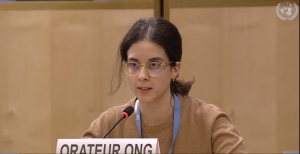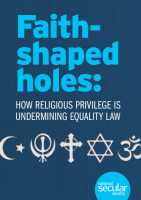Bigotry based on the idea of 'caste' has no place in modern Britain.
We want to see those at risk of caste discrimination protected by UK law.
'Caste' systems are rooted in ancient religious and cultural beliefs. They are imbued with inequality and discrimination, and are wholly incompatible with human rights.
There are an estimated 50,000 – 200,000 people in the UK who are regarded by some as 'low caste' (sometimes known as 'dalits') and at risk of caste discrimination. There is evidence of caste-based discrimination and harassment present in employment, education and in the provision of services.
Caste-based prejudice and discrimination is a gross violation of human rights and must not be tolerated. All individuals have the right to protection against discrimination on the basis of their caste or perceived caste, in the same way that they do on the basis of race or gender
Our equality laws do not explicitly deal with the issue of caste, meaning victims of caste discrimination have to use unclear and precarious case law to secure justice. Both parliament and the United Nation Human Rights Council have called on the government to explicitly outlaw caste-based discrimination, but it has delayed doing so for years.
It's time to outlaw caste discrimination.
Take action!
1. Have you experienced caste discrimination? Report it!
The Dalit Solidarity Network's "everyday casteism" campaign is cataloguing instances of casteist behaviour, including incidents of discriminatory or caste hate speech behaviour, experienced on a day to day basis by people perceived to be 'lower' caste in the UK.
If you have been affected by caste discrimination, please consider reporting it to them.
You can also report caste discrimination to the Anti Caste Discrimination Alliance here.
2. Write to your MP
Tell your MP that it's time to outlaw caste discrimination.
3. Join the National Secular Society
Become a member of the National Secular Society today! Together, we can separate religion and state for greater freedom and fairness.
Latest updates
Push government on caste discrimination, NSS tells UN rapporteur
Posted: Fri, 29 May 2020 10:23
The National Secular Society has urged the UN special rapporteur on minority issues to push the UK government to outlaw discrimination on the grounds of 'caste'.
The NSS also urged the rapporteur, Fernand de Varennes (pictured), to ensure non-religious victims of persecution worldwide are afforded equal protection to those from religious communities.
The rapporteur has called for evidence as he prepares a report to the upcoming 75th session of the UN general assembly, on the significance and scope of minorities' rights in the UN system.
Caste discrimination
Ministers have repeatedly refused to amend the 2010 Equality Act to outlaw discrimination on the grounds of caste, preferring instead to rely on the potential evolution of case law.
The NSS's submission urged the rapporteur to "strongly encourage" the government to amend the act. The UN has previously given a formal recommendation that the government do this to comply with its treaty obligations.
The NSS said attempts to deal with the problem through an evolution in case law were unlikely to be effective, particularly as victims are unlikely to be able to launch legal challenges.
Protection of non-religious
The NSS also called on the rapporteur to ensure non-religious people who face human rights abuses around the world are given equal protection to religious minorities.
The society said human rights violations experienced by the non-religious are often sidelined or ignored, because:
- Non-religious people are often from strict religious backgrounds and so face pressure to hide their lack of religious belief.
- Non-religious people tend to be less likely to form large communities based around their religious identities than religious groups.
- Non-religious people often do not regard their personal views as a significant part of their personal identity in the way some religious groups do.
The NSS also said the term 'religious minority' should be replaced with a term which is more inclusive of non-religious victims of persecution, such as "religion or belief minority".
NSS comment
NSS head of policy and research Megan Manson said: "Caste discrimination is a serious violation of human rights, but the UK government's deeply inadequate approach to the issue fails to honour its international treaty obligations. We hope the UN special rapporteur will bring pressure to bear on ministers to change this.
"The rapporteur should also take the opportunity to tackle the persecution of non-religious people. That requires an acknowledgement of the limitations of a communal approach to dealing with persecution and a reaffirmation of the universal right to freedom of religion or belief."
Caste discrimination in the UK
- Research published on the gov.uk website has estimated that at least 50,000 (and perhaps in excess of 200,000) people who live in the UK are at risk of caste discrimination.
- In 2018 the Equality and Human Rights Commission criticised the government's position on caste discrimination.
Global persecution of the non-religious
- The 2019 edition of the Freedom of Thought Report, published by Humanists International, found that people could effectively be put to death for expressing atheism in 13 countries.
Image via Twitter.
NSS urges UN to push government to pass law on caste discrimination
Posted: Wed, 11 Mar 2020 14:22
The National Secular Society has urged the UN Human Rights Council to push the UK government to legislate to outlaw discrimination on the grounds of 'caste'.
In an oral statement to the council, NSS vice-president Josephine Macintosh highlighted the government's failure to legislate on the issue and described its approach as "grossly inadequate".
Ministers have refused to amend the 2010 Equality Act to outlaw discrimination on the grounds of caste, preferring instead to rely on the potential evolution of case law.
Josephine Macintosh said this approach "amounts to a covert refusal" to implement a UN recommendation in 2012, which said the UK should legislate in line with its human rights obligations.
She said the government is risking the setting of a precedent that reduces protection against discrimination, and that those most in need of protection are unlikely to have funds to mount a legal challenge.
And she said the result had "distinctly detrimental effects" on victims, ranging from depression and social isolation to loss of employment and reduced access to old people's day centres.
She told the UNHRC that the NSS "deeply regret(s) that the UK government has shown so little concern to protect the victimised".
And she called on the council, the UN's committee on the elimination of racial discrimination and state parties to "strongly encourage" the UK to comply with its treaty obligations by legislating.
The NSS's intervention came during a debate on human rights situations that require the council's attention at its 43rd regular session in Geneva.
The NSS also submitted a written statement on the subject.
The impact of caste discrimination
- Research published on the gov.uk website has estimated there are at least 50,000 (and perhaps in excess of 200,000) people living in the UK who are regarded by some as 'low caste' and at risk of caste discrimination.
- The research found evidence of caste-based discrimination, harassment and bullying present in employment, education and in the provision of services.
Relevant NSS lobbying
- The NSS's campaign page on caste discrimination and briefing on the subject further explain its position and work in this area.
- The NSS has been in special consultative status with the United Nations Economic and Social Council since 2016.
Watch the NSS's statement





